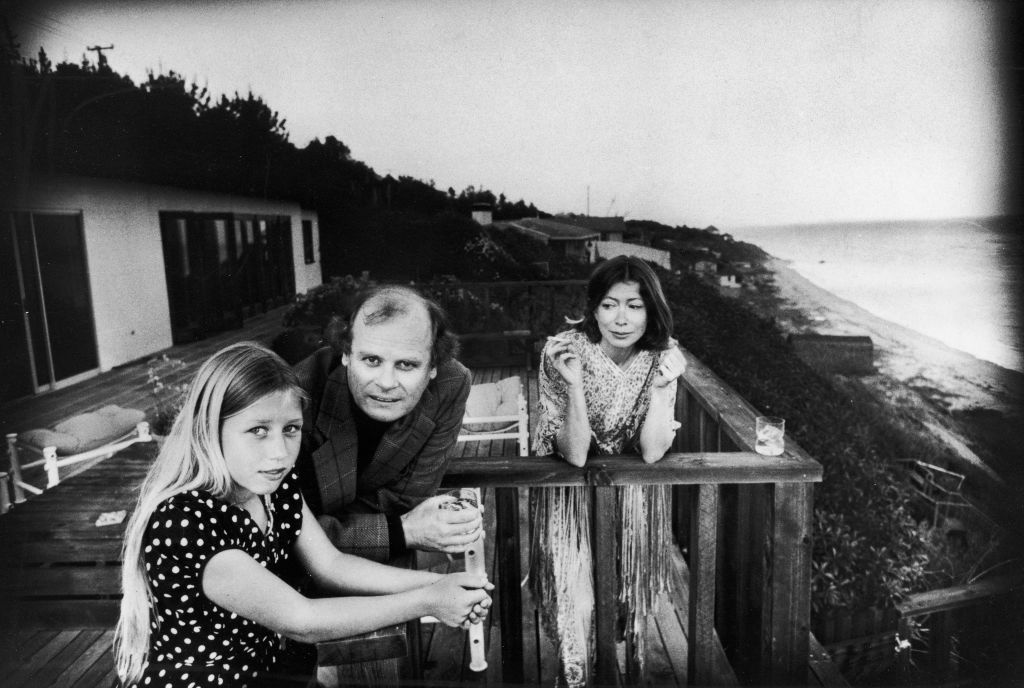How can a woman writer be appealing? She can’t really be an “intellectual,” at least not without being entirely desexed (Gertrude Stein, Hannah Arendt). She can’t be “funny” — no one really buys that women are funny. She can be emotional, but she might end up like an Elizabeth Wurtzel: laughable to the point of indecency.
The answer, of course, comes from Joan Didion, who died today at the age of 87. Didion was not beautiful, not sexy, but glamorous. That’s what she was: glamorous, with her Corvette Stingray and her icicle limbs and her cigarettes and leotards and mohair and bourbon and Dexedrine and despair. There was something transcendent about her, like she’d managed to forget she was a woman, even as she was fashionable and married and almost sociopathically attuned to the niceties of dress and decoration. There was sadness, there, too, like a bleeding vein across the page. But she was so hardened, so clear-eyed, that she didn’t feel like a “woman writer.” When Interview Magazine asked her, “Why can’t it just be magic all the time?”, she said, “What.” You couldn’t imagine seducing Joan Didion.
Like everybody else, I wanted to be Joan Didion. Like everybody else, I started with Slouching Toward Bethlehem. I was a young woman in Florida; she’d been a young woman in California. We were both from places where there were bougainvilleas and palm trees and sunshine and a sense that the world was just beginning to lose its meaning. We were from places on the edge of the country that seemed sinister and malformed, as if the sunnier a place was, the more cracks in the surface you could see. In her Berkeley address “Why I Write,” she said she wrote only to answer the question: “What is going on in these pictures in my mind?,” those images — burning oil refineries in the Carquinez Strait, the lights in the Bevatron particle accelerator — that “shimmer around the edges” like Louis Wain’s cats as he slid into schizophrenia. For a young girl who wrote almost nothing and was convinced she was a writer, who had learned in AP government that we were living in “the end of history,” it was intoxicating: Didion could make the meaninglessness matter.
In “Slouching Toward Bethlehem,” the Haight-Ashbury wasn’t a free-love utopia; it was a nightmare of stoned children and kitchen fires and teenage girls raffled off by dealers. In “Goodbye to All That,” New York was the paradise where “I was late to meet someone but I stopped at Lexington Avenue and bought a peach and stood on the corner eating it and knew that I had come out of the West and reached the mirage.” Later, it became the place where “Everything that was said to me I seemed to have heard before, and I could no longer listen.” Her most famous essays were written by a very young woman in a youth-obsessed time who knew that if youth is the prize, you’re always going to lose.
She was no dupe. “I still believed in possibilities then,” she wrote in the same essay. How did it feel to read that, as a twenty-something myself? It was like she was cutting through the noise. The Obama years were a sort of ‘60s-redux; we were told that this time, liberation really was coming. In 2008, the slogans were “Yes We Can,” “Hope,” and, simply, “Change.” As a woman, with Bush out of office and the era of purity rings at a close, you were told that the best thing to do was put out. And yet nothing seemed to change. Women seemed to feel sad exactly as before, but also to feel stupid for feeling sad.
Reading Didion on the ‘60s, it felt like she was the first It-Girl to tell it like it was: “I still believed in possibilities then,” she wrote of herself in her early 20s. Reading her at the edge of the world, in bright sunlight, in a time of drone strikes and bank collapse and the most inspiring president in American history, I began not to believe in them.











Join the discussion
Join like minded readers that support our journalism by becoming a paid subscriber
To join the discussion in the comments, become a paid subscriber.
Join like minded readers that support our journalism, read unlimited articles and enjoy other subscriber-only benefits.
Subscribe